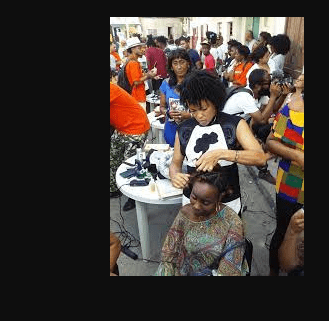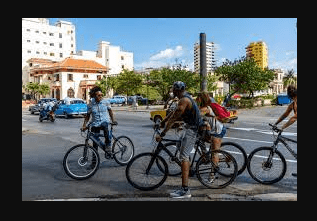
Best Afro Cuban Business in Havana;-CET is committed to recognizing, collaborating with, and learning from Afro Cuban artists, businesses, and professionals in the future after being moved by the spirit and messages of demonstrators around the United States and the rest of the world. It is past time for more advancement in the battle against racism and prejudice, social justice, and having meaningful conversations.
In order to develop bridges between the island and the outside world and address these concerns, CET will keep growing its local collaborations. In order to improve hiring methods, sensitivity training, and analysis of the businesses, organizations, and people we interact with, CET is also conducting an internal evaluation. We’ll collaborate with partner organizations as part of this endeavor to recognize Afro Cuban-owned and run businesses throughout the island, beginning with this list.
10+ Best Afro Cuban Business in Havana
1.Salchipizza

You can locate a little bakery with big posters of Malcom X and Martin Luther King Jr., as well as a ceiling covered in upside-down hanging champagne glasses, while strolling down one of Central Havana’s main avenues. Alberto Gonzalez, the first Cuban chef to ever receive a Michelin star, owns Salchipizza. He employs conventional procedures to recreate classic Afro-Cuban dishes and draws on his experience as a chemical engineer in the food business to develop cutting-edge cooking methods. Making traditional meals, he claims, is his way of showing respect.10+ Best Afro Cuban Business in Havana
2.ReglaSOUL

Alexey “El Tipo Este,” a hip-hop duo member and activist, and photographer and filmmaker Amberly Alene founded the project ReglaSOUL. Through events and workshops in their neighborhood of Regla, Havana, the organization advocates for a complementary holistic lifestyle and plant-based medicine. “To provide care and resources for the residents of our community who have little access to the tools to further enhance their self-care, mental health, nutrition, and overall wellness for themselves and their families,” reads the organization’s mission statement.
We hope to entice Afro descendants from inside and outside of Cuba to assist us in building the sustainable infrastructure required to improve the outlook on wellness for the black and brown residents of the municipality through our international retreats and joint projects.10+ Best Afro Cuban Business in Havana
3.Beyond Roots
Adriana Heredia, a university professor, established Beyond Roots with the intention of empowering individuals and disseminating the culture of her Guanabacoa village. Adriana recognized a significant gap in the representation of Afro-Cubans in the Cuban tourism industry and decided to exploit it. Her first Airbnb experience, which explored Afro-Cuban culture, was a huge hit. She eventually developed other activities, including Afro Cuban cuisine, religion, art, and dance, and as more visitors visited, the more requests she received for Afro Cuban wares and mementos. She then started collaborating with local artists and craftspeople to do precisely that, and in 2019 she launched a shop in Old Havana offering Afro Cuban items.10+ Best Afro Cuban Business in Havana
Also see;The 10 Best Airports in America,
4.Lo Llevamos Rizo

Susana Pilar started the Lo Llevamos Rizo project in 2015 to organize celebrations and provide information for natural afro hair. Lo Llevamos Rizo continues to share history, offer tools, and hold virtual workshops on maintaining natural hair after an incredibly successful workshop in 2019.10+ Best Afro Cuban Business in Havana
5.Tostonet
The workshop run by Liber Puente Baró and his crew is conveniently located next to Coppelia in Vedado and can handle all of your technology requirements. Along with creating a formidable tech workshop, Puente Baró has worked with over 30 different state-run organizations to develop software and market products while successfully navigating Cuba’s complex legal frameworks. This includes repairing, optimizing, and maintaining laptops, phones, and printers as well as optimizing and maintaining software. Although TostoneT has been operational since 2012, Puente Baró, who studied mechanical engineering and developed an early interest in computer systems, has big plans for his business that have only started. You can reach them here.
6.Zulu
In the midst of the island nation’s economic crisis known as the Special Period in 1992, Hilda Zulueta launched Zulu bags. Although it was an unexpected time to launch a business, she viewed it as a chance to aid in the recovery of her family. She started creating and weaving handmade leather purses, first creating stunning and distinctive designs out of leather scraps.
After years of developing her abilities and enlisting the help of other family members, Hilda has developed a gorgeous, distinctive, and identifiable brand that highlights her excellent craftsmanship. To view their whole selection of bags, which includes anything from little pocketbooks and handbags to back packs and duffel bags made of leather, go to their store in Old Havana.10+ Best Afro Cuban Business in Havana
7.El Café

Nelson Tamayo Rodriguez made the decision to return home to Havana and open his own cafe after spending six years working in cafes in London. El Café specifically. With its mouthwatering sandwiches, foamy coffees, and fresh juices, El Café has swiftly established itself as a must-visit in Havana. Nelson has established a following on Amargura Street by serving straightforward but high-quality food.
Don’t Miss;Top 10 Best Tourist Attraction in Every State-USA
8.Dador
Friends from Havana’s Institute of Design, Lauren Fajardo, Isle Anton, and Raquel Janero, created DADOR. They each pursued different interests after graduating ten years ago, up until 2015, when private sector reforms in Cuba began to take hold. The opening served as inspiration for the development of a sustainable, well-designed clothing line based in Havana, Cuba. “I look forward to creating a forward-thinking, sustainable business that is part of the creative output of an emerging group of talented Cuban fashion designers who are making socially relevant, thoughtfully designed, well-crafted locally made goods that bring a modern take to Cuban fashion,” Lauren said in an interview with us in 2019.10+ Best Afro Cuban Business in Havana
9.Jibaro
Marlon White Luna, a recent graduate of the Academy of Fine Arts with a focus in Digital Art, founded the apparel line Jibaro, which is situated in Havana. Through his own brand Jibaro, he has spent the last three years concentrating on underground fashion. Jibaro is an act of freedom that connects postmodern civilization with Biblical thought, two worlds that are progressively becoming more and more remote from one another.10+ Best Afro Cuban Business in Havana
1o.Citykleta

Yasser Gonzalez founded the bike tour company Citykleta, which has its headquarters in Havana. After training and working toward becoming a software developer, he made the decision to pursue bikes as his true love. He established Citykleta as the first private cycle tour company in the area with the additional goal of transforming Cuba’s riding culture. He started a monthly midnight bike ride for Cubans as part of his travels to promote riding in Cuba, a sport with a long history of unfavorable stereotypes.
Many Cubans were compelled to use the hundreds of thousands of bicycles that were smuggled in as aid from China to travel around after the demise of the Soviet Union wrecked havoc on the island nation’s economy. Yasser hopes to usher in a new era of motorcycling in Cuba by.10+ Best Afro Cuban Business in Havana
11.Que Negra
There are hardly any specific goods that serve the demands of the afro-descendent community on an island where scarcity is a daily occurrence. Que Negra, Erly Pennycook Ramos’ brand of all-natural hair products for afro-hair, aims to change that. Que Negra sells items to moisturize, maintain, and treat natural curls. Erly was inspired to create the product line because she wanted to offer young women celebrating their quinceaneras an alternative to the damaging chemicals used to straighten hair.
Since everything in the line is obtained and made locally in Ciego de Avila, where Erly is from, she believes that Cubans should rely less on imports and concentrate on what they already have. She sells her goods in stores in Havana including Beyond Roots.
12.Robe “El Ninho”’s El Gao
Owner of the barbershop El Gao and rapper Roberto Alvarez. According to an interview with him published in the Havana Times, his mission is as follows: “We advocate for natural hair, not because we disapprove of long, straight hair, but rather because of the harm these treatments do to people who, a lot of the time, want to adhere to an imposed and widely-accepted stereotype. In order for “you to seem attractive with your own style, who you are,” he must find a solution.
According to a 2017 New York Times article, “Cuban barber Roberto Alvarez has a temporary “mini-salon” in Havana that attracts long lines of men seeking fades. Some of the most popular cuts in Havana right now? El tiburón (a low-cut mohawk), el yonki (a tall, wide crest), and el.10+ Best Afro Cuban Business in Havana
FAQs
- What business can be done in Cuba?
Other industries that could gain by cooperating with Cuba include travel and tourism, real estate, information technology, biotechnology, and agriculture. All of these are fields that the Cuban government is eager to advance.
- What is the biggest company in Cuba?
The largest holding firm in Cuba, GAESA, is led by brigadier general Luis Alberto Rodrguez López-Callejas, a former son-in-law of president Raul Castro. GAESA is a conglomerate of more than 50 enterprises that are all run in accordance with market laws.
- Who owns most of the businesses in Cuba?
A tendency toward increasing employment in the private sector has emerged in recent years. Compared to 91.8% to 8.2% in 1981, the employment ratio in the public sector was 78% in 2006 and 22% in the private sector. Currently, the Cuban state owns most businesses in Cuba either entirely or in part.
Be the first to comment